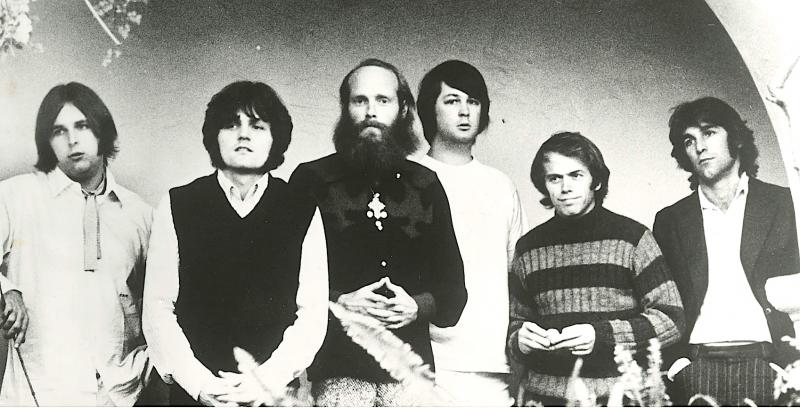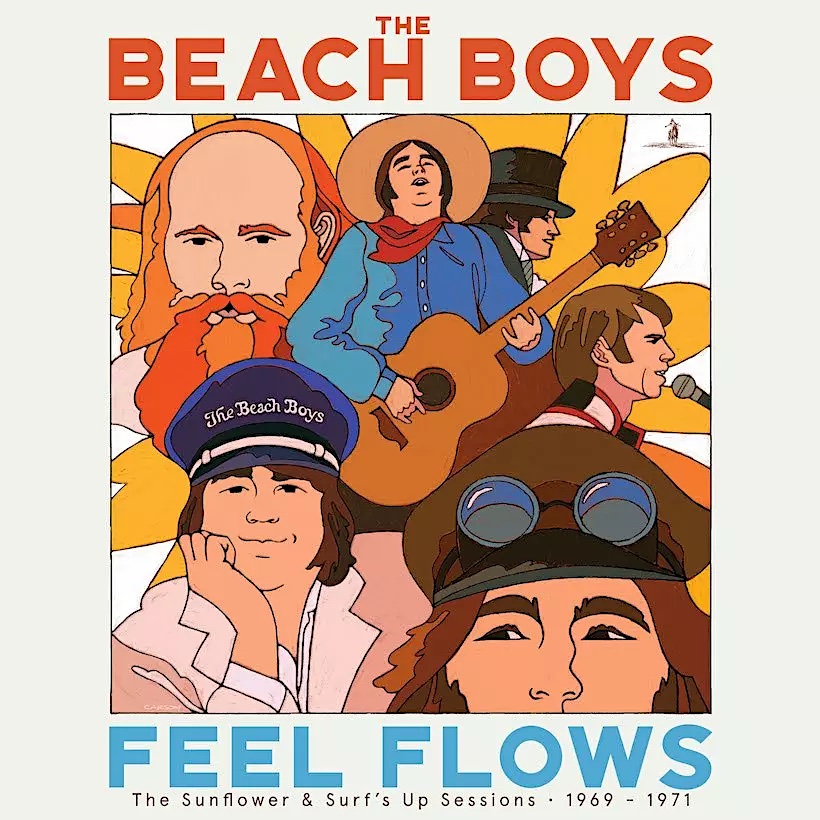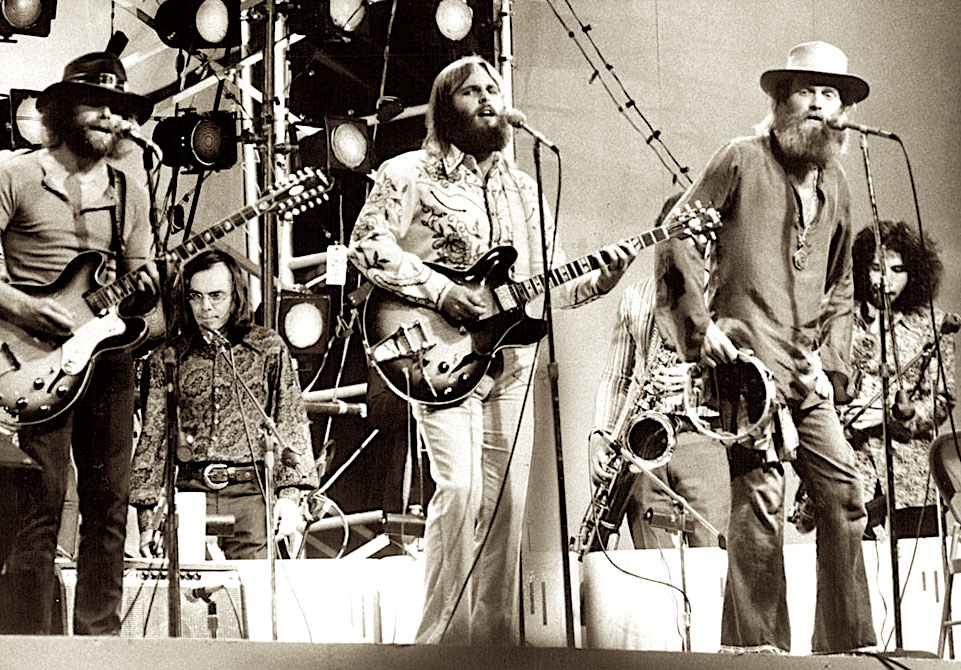The Beach Boys: Feel Flows - the Sunflower and Surf's Up Sessions 1969-1971 | reviews, news & interviews
The Beach Boys: Feel Flows - the Sunflower and Surf's Up Sessions 1969-1971
The Beach Boys: Feel Flows - the Sunflower and Surf's Up Sessions 1969-1971
Five-disc examination of how the band evolved to meet the 1970s

“Add some music to your day,” the Beach Boys urged in their song of the same name, from their 1970 album Sunflower. There’s far more than a day’s worth of music included on this immense five-CD package, which scrutinises the turn-of-the Seventies Beach Boys in miniscule detail as they made the awkward transition from their California surf-and-sand past to a more diffuse, more democratic and in many ways more interesting group.
The Feel Flows set presents complete versions of Sunflower and its 1971 follow-up Surf’s Up, spruced up and sharpened to a punchy full-spectrum clarity noticeably superior to the 2009 remasters available on Spotify. On top of that there are complementary live and unreleased tracks from both albums, a cappella versions of pieces both released and unreleased, radio ads, and a cluster of backing tracks and unfinished fragments of songs either on or written in the same period as the albums in question. You’d have to be nursing a serious Beach Boys habit to shell out for the full five-disc set plus hardcover book with photos, lyric sheets, comprehensive but not terribly critical essay by Howie Edelson etc, though the chill wind through your wallet can be ameliorated somewhat by opting for the various CD, vinyl or MP3 versions.
 The end of the 1960s was a time of turmoil for the Beach Boys (pictured left, young Beach Boys). They’d defined a unique blend of intricate vocal harmonies and melodic brilliance with the likes of "California Girls", "Good Vibrations" and the peerless "God Only Knows", but their star was waning in the USA, even though they were still pulling crowds around the world. They were prisoners of the “surf-pop” tag from their “Surfin’ Safari”/ “Surfin’ USA” era, but the group had inevitably grown older and gone through changes, as indeed had the wider society around them. Original mastermind Brian Wilson had lapsed into a twilight zone of mental illness, exacerbated by drugs and over-eating.
The end of the 1960s was a time of turmoil for the Beach Boys (pictured left, young Beach Boys). They’d defined a unique blend of intricate vocal harmonies and melodic brilliance with the likes of "California Girls", "Good Vibrations" and the peerless "God Only Knows", but their star was waning in the USA, even though they were still pulling crowds around the world. They were prisoners of the “surf-pop” tag from their “Surfin’ Safari”/ “Surfin’ USA” era, but the group had inevitably grown older and gone through changes, as indeed had the wider society around them. Original mastermind Brian Wilson had lapsed into a twilight zone of mental illness, exacerbated by drugs and over-eating.
Their album 20/20 from early 1969, much of it older material dusted off for the occasion, didn’t make the Top 50 in the States, though they scraped a Top 20 hit with "Do It Again" (a chart-topper in the UK). Another of the album tracks was “Never Learn Not To Love”, Dennis Wilson’s reworking of Charles Manson’s composition, “Cease To Exist”. The Sharon Tate killings perpetrated later in 1969 by Manson and his “family” threw a ghastly light over Dennis’s ill-judged friendship with the murderous cultist, and further clouded the image of his band.
All this coincided with the end of the Boys’ contract with Capitol Records on 30 June 1969. Battling a pile of debts, partly caused by a catastrophic tour with the Maharishi Mahesh Yogi, where most of the 29 dates were cancelled after the Maharishi quit, they’d already been shopping unsuccessfully for a new label. They were eventually rescued by a deal with Warners executive Mo Ostin, who signed them to the company’s Reprise imprint. The agreement also resurrected the group’s own label, Brother Records.
 Sunflower was the first album under the new deal. Though a poor seller (it peaked at 151 on the US chart), it pleased the critics. After the disappointment of 20/20, which Dennis Wilson assessed as “the only letdown of the Beach Boys’ career … the first album the group made that was completely disjointed”, Sunflower represents a kind of renaissance, reflecting the way the group were adapting and evolving now that Brian Wilson was still on the team but not the dominant creative force.
Sunflower was the first album under the new deal. Though a poor seller (it peaked at 151 on the US chart), it pleased the critics. After the disappointment of 20/20, which Dennis Wilson assessed as “the only letdown of the Beach Boys’ career … the first album the group made that was completely disjointed”, Sunflower represents a kind of renaissance, reflecting the way the group were adapting and evolving now that Brian Wilson was still on the team but not the dominant creative force.
Reprise rejected early versions of Sunflower, but it was finally ready in late July 1970, and the “disjointedness” Dennis complained of has been replaced by a harmoniousness of mood and arrangement that makes its dozen tracks flow together like the “Cool, Cool Water” hymned in the closing track (“in an ocean or in a glass, cool water is such a gas”). If it’s hard rockin' you crave, the Boys may not be your go-to destination, though they warm it up a bit on “It’s About Time” and “This Whole World”. The heart of the matter, though, is their natural feel for glowing melodies and peerless vocal arrangements, as on Brian Wilson and Mike Love’s mantra-ish “All I Wanna Do” and Bruce Johnston’s dreamily sentimental ballads “Deirdre” and “Tears in the Morning” (forerunners of his “Disney Girls” from Surf’s Up). It’s not much of a stretch to imagine Herb Alpert rearranging "Deirdre" for his Tijuana Brass. Instructive extras included here include Dennis’s “San Miguel” and the intriguingly circular “Celebrate the News”, while the carnival-esque “Loop de Loop” would sit nicely on the soundtrack of aviator drama The Great Waldo Pepper.
The process that brought about Sunflower elided into the creation of Surf’s Up (1971), which became their first Top 40 album in three years, helped find them a new audience, and occupies a niche of its own as one of the group’s most haunting creations. New manager Jack Rieley was encouraging the Boys to get loose, grow beards and even jam with the Grateful Dead at the Fillmore East, and they were tapping into the turbulent, exploratory mood of the age. Considering issues of life, death, spirituality and (in "Don’t Go Near the Water" and "A Day in the Life of a Tree") ecology, Surf's Up was capped by its title track, originally written by Brian Wilson and Dyke Parks for the mythical lost Smile album (pictured below, the Boys in New York's Central Park, 1971).
Finally completed, the song is its own mini-universe, and hovers over the album like a self-contained journey from decadence and despair to shining rebirth… though Parks’s allusive, illusory lyrics could be interpreted in an infinite number of ways. There are various iterations of “Surf’s Up” here, including a 2019 mix which changes the vocal balance around, a live recording from 1973, a complete a cappella take, and an unfinished version of the first section from 1971.
 Elsewhere, one notable rarity is Mike Love’s previously unreleased original 1970 version of “Big Sur”, a song which was reworked for Holland in 1973. Outtakes from the Surf’s Up sessions, however, generally make it plain why they didn’t appear on the album. The bizarre “H.E.L.P. Is on the Way” is a warning about eating junk food and getting fat, while Brian Wilson’s “My Solution” finds him impersonating a mad scientist accompanied by doomy sci-fi music. Especially queasy is a version of “Seasons in the Sun”, originally by Jacques Brel, of which Love observed that “it was so wimpy we had to throw it out”. However, the co-producer on the track, Terry Jacks, recorded his own version, which topped the US chart and sold 14 million copies. Go figure.
Elsewhere, one notable rarity is Mike Love’s previously unreleased original 1970 version of “Big Sur”, a song which was reworked for Holland in 1973. Outtakes from the Surf’s Up sessions, however, generally make it plain why they didn’t appear on the album. The bizarre “H.E.L.P. Is on the Way” is a warning about eating junk food and getting fat, while Brian Wilson’s “My Solution” finds him impersonating a mad scientist accompanied by doomy sci-fi music. Especially queasy is a version of “Seasons in the Sun”, originally by Jacques Brel, of which Love observed that “it was so wimpy we had to throw it out”. However, the co-producer on the track, Terry Jacks, recorded his own version, which topped the US chart and sold 14 million copies. Go figure.
Feel Flows is a sonic labyrinth in which Beach Boys aficionados might lose themselves ad infinitum, though the mainstream listener might wonder what on earth is the point of all these fragments and unfinished takes. I suppose you could use the vocals-less backing tracks to host your own Beach Boys karaoke nights. But if it’s for you, you’ll know.
- Feel Flows is released on Friday 27 August
rating
Explore topics
Share this article
The future of Arts Journalism
You can stop theartsdesk.com closing!
We urgently need financing to survive. Our fundraising drive has thus far raised £49,000 but we need to reach £100,000 or we will be forced to close. Please contribute here: https://gofund.me/c3f6033d
And if you can forward this information to anyone who might assist, we’d be grateful.

Subscribe to theartsdesk.com
Thank you for continuing to read our work on theartsdesk.com. For unlimited access to every article in its entirety, including our archive of more than 15,000 pieces, we're asking for £5 per month or £40 per year. We feel it's a very good deal, and hope you do too.
To take a subscription now simply click here.
And if you're looking for that extra gift for a friend or family member, why not treat them to a theartsdesk.com gift subscription?
more New music
 Cat Burns finds 'How to Be Human' but maybe not her own sound
A charming and distinctive voice stifled by generic production
Cat Burns finds 'How to Be Human' but maybe not her own sound
A charming and distinctive voice stifled by generic production
 Todd Rundgren, London Palladium review - bold, soul-inclined makeover charms and enthrals
The wizard confirms why he is a true star
Todd Rundgren, London Palladium review - bold, soul-inclined makeover charms and enthrals
The wizard confirms why he is a true star
 It’s back to the beginning for the latest Dylan Bootleg
Eight CDs encompass Dylan’s earliest recordings up to his first major-league concert
It’s back to the beginning for the latest Dylan Bootleg
Eight CDs encompass Dylan’s earliest recordings up to his first major-league concert
 Ireland's Hilary Woods casts a hypnotic spell with 'Night CRIÚ'
The former bassist of the grunge-leaning trio JJ72 embraces the spectral
Ireland's Hilary Woods casts a hypnotic spell with 'Night CRIÚ'
The former bassist of the grunge-leaning trio JJ72 embraces the spectral
 Lily Allen's 'West End Girl' offers a bloody, broken view into the wreckage of her marriage
Singer's return after seven years away from music is autofiction in the brutally raw
Lily Allen's 'West End Girl' offers a bloody, broken view into the wreckage of her marriage
Singer's return after seven years away from music is autofiction in the brutally raw
 Music Reissues Weekly: Joe Meek - A Curious Mind
How the maverick Sixties producer’s preoccupations influenced his creations
Music Reissues Weekly: Joe Meek - A Curious Mind
How the maverick Sixties producer’s preoccupations influenced his creations
 Pop Will Eat Itself, O2 Institute, Birmingham review - Poppies are back on patrol
PWEI hit home turf and blow the place up
Pop Will Eat Itself, O2 Institute, Birmingham review - Poppies are back on patrol
PWEI hit home turf and blow the place up
 'Fevereaten' sees gothic punk-metallers Witch Fever revel in atmospheric paganist raging
Second album from heavy-riffing quartet expands sonically on their debut
'Fevereaten' sees gothic punk-metallers Witch Fever revel in atmospheric paganist raging
Second album from heavy-riffing quartet expands sonically on their debut
 theartsdesk Q&A: Soft Cell
Upon the untimely passing of Dave Ball we revisit our September 2018 Soft Cell interview
theartsdesk Q&A: Soft Cell
Upon the untimely passing of Dave Ball we revisit our September 2018 Soft Cell interview
 Demi Lovato's ninth album, 'It's Not That Deep', goes for a frolic on the dancefloor
US pop icon's latest is full of unpretentious pop-club bangers
Demi Lovato's ninth album, 'It's Not That Deep', goes for a frolic on the dancefloor
US pop icon's latest is full of unpretentious pop-club bangers
 Yazmin Lacey confirms her place in a vital soul movement with 'Teal Dreams'
Intimacy and rich poetry on UK soul star's second LP
Yazmin Lacey confirms her place in a vital soul movement with 'Teal Dreams'
Intimacy and rich poetry on UK soul star's second LP
 Solar Eyes, Hare & Hounds, Birmingham review - local lads lay down some new tunes for a home crowd
Psychedelic indie dance music marinated in swirling dry ice
Solar Eyes, Hare & Hounds, Birmingham review - local lads lay down some new tunes for a home crowd
Psychedelic indie dance music marinated in swirling dry ice

Add comment